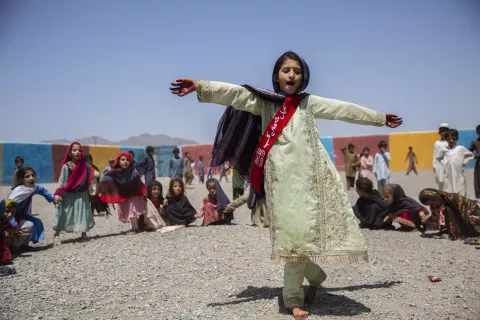It was in Sujawal, Sindh, on a warm day that I met a bright and witty young woman called Maryam. We sat on traditional moorho (chairs) by a small mudbrick house, and she told me how she had wanted to be a teacher. She had been one of the best students at school, she recounted.
However, at 12-years-old, her life changed when her parents, influenced by relatives, first took her out of school and then married her off to a man twice her age. In Sindh, where marriage under 18 is prohibited by law, her dreams were shattered by an illegal act.
Now at the age of 19 and a mother of two, Maryam can only lament the decision of her parents, while ascribing her circumstances to destiny. As I left that charming girl behind, I could still feel the remnants of that once tremendous ambition shine in her eyes.
Maryam is one of 19 million girls and women in Pakistan who were married during childhood. Child marriage not only deprives children of their childhood but also takes away a girl’s right to education.
It also affects their physical health, emotional well-being, education, and future prospects. It often denies them their basic rights, exposing them to risks such as early pregnancy, domestic violence, and limited opportunities for personal and economic development.
It can perpetuate cycles of poverty and inequality, hindering progress towards gender equality and sustainable development. Similarly, it strips away the right of decision-making from girls and women, exacerbating power imbalances and restricting their autonomy in shaping their lives.

Maryam is a reflection of the adversities that young girls face in our country. The patriarchal society, harmful norms and gender inequality further impedes the rights of girls to access education and health services specifically in the rural areas of the country. There are countless others whose voices go unheard and whose aspirations are stifled by the shadows of gender-based injustices and discrimination.
Women comprise almost half of the population in Pakistan, and if educated, are important contributors to the progress of our country. Yet, the literacy rate for women is just 45 per cent, compared to 71 per cent for men.
It is the need of the hour to chart out plans ensuring that adolescent girls and boys in Pakistan, and other low- and middle-income countries, have equal access to opportunities. As emphasized in UNICEF's action plan, investing in girls' education, vocational training, entrepreneurship skills, and financial opportunities is imperative for sustainable development.

Implementing well-curated ideas to economically empower girls will not only reduce poverty but also foster economic growth. A notable example is the "Grameen Bank" initiated by Nobel Prize winner Muhammad Yunus in Bangladesh. Over 95 percent of its microfinance loans were allocated to women, showcasing their self-empowerment and economic contribution.
Another example is Nepal's "Rupantaran" - Social and Financial Skills Package initiative, which equips adolescents with knowledge and skills to influence decisions that affect their lives such as education and marriage enabling them to become change agents of their communities. “Rupantaran” has been considered one of the effective programs that has helped and is helping the adolescent females to be upfront and make outstanding changes in their lives.
These successes can inspire similar initiatives in Pakistan to empower women and girls, thereby bolstering the nation's economy and fostering inclusive growth.
UNICEF is collaborating with various partners in Pakistan at individual, community, and institutional levels to prevent child marriage. These partners include National Commission on the Rights of Child (NCRC), National Commission on the Status of Women (NCSW), United Nations (UN) agencies, and stakeholders like religious leaders and media.
I hope that through UNICEF initiatives, girls like Maryam can achieve her life goals without the fear of losing their childhood to early marriage.

Reflecting on Maryam’s story, I thought about how this could be stopped if Maryam had been given an opportunity to exercise her voice and agency through education as a young child, or knew that there were advocates for her rights, who work tirelessly to prevent the injustice like the one she experienced and who could have intervened to stop the family from subjecting her to such a harmful practice.
If only her parents had been aware of the implications of child marriage and the importance of educating their daughter so that she could contribute effectively to the economic prosperity of this country.
Last month we marked International Women’s Day. But every day, let’s all pledge to raise awareness against gender-based discrimination every single day.
Let’s engage men and boys to become champions in the advancement of the rights of women and girls in our society. Let’s resolve to invest in girls and provide them with a supportive and conducive environment, to enlighten those around us about the significance of empowering and educating women and girls for a more equitable, inclusive, and progressive future.
About the Author
Masooma Zahra is 24-year-old Media and Communication intern at UNICEF Islamabad. She holds a Bachelor's degree in International Relations and is passionate about addressing social problems and promoting sustainable development.


